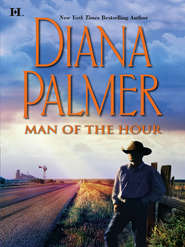По всем вопросам обращайтесь на: info@litportal.ru
(©) 2003-2024.
✖
Heartless
Настройки чтения
Размер шрифта
Высота строк
Поля
“What was that about?” she asked hesitantly when they were back in the truck.
“Barker?” he asked absently.
“No. Harley.”
His jaw tautened. “Harley’s a boy.”
She was disconcerted. “He’s a nice boy,” she protested.
He didn’t say a word.
She shifted in her seat, frowning. Jason was very strange lately. She didn’t understand why there was so much anger smoldering inside him. He was probably still angry with that Barker man, she decided, and left him to his thoughts.
Jason was unusually uncommunicative during the ride home, keeping the radio between them while he drove. His attitude toward Harley puzzled her. It wasn’t like him to snap at underlings, especially cowboys, and he’d already made it obvious that he disliked men who put poor people down. He didn’t know Harley well, but he’d seemed to like the younger man. Or at least, he had until today. It was almost as if he were jealous of Harley’s interest in Gracie. That was silly, of course. He was affectionate toward her, but there was nothing out of the ordinary in his demeanor. It was just wishful thinking. She grimaced, thinking about how she might react if Jason ever really pursued her as a lover would. Love was one thing. Sex…well, that was terrifying. She wasn’t sure she could function in that respect. Not even with Jason, and he’d been the only man in her life and her heart for years.
Chapter Two
TWO DAYS LATER, GRACIE WAS back in her flower beds. This time she’d pruned back some aggressive wandering vines that had exploded with growth after the passage of Hurricane Fay when it made landfall. The rains had been torrential. Now everything was overgrown because of the bountiful rain. After months of drought, it was wonderful to see green things again.
It was Friday and she was hosting an important party for Jason this evening. It was business. He hated parties, but he was wheeling and dealing again, hoping to add a new and imaginative software company from California to his roster of acquisitions. The two owners were in their twenties and crazy about soccer, so Jason had invited members of the Brazilian and American soccer teams to this gathering. It was like him to know the deepest desires of his prey and cater to them, when he wanted something.
She wondered absently if he was single-minded and determined like that with women he wanted. It hurt to think about that.
She didn’t dare think of Jason in any sexual way. It would only lead to heartache. Her mother had warned her about it, and she herself had seen the result from the time she was very little. Her father could only achieve satisfaction by hurting his wife, savaging her. The blood on her nightclothes testified again and again to the brutality of ardent men. Gracie’s entire childhood had been a nightmare of fear for her mother, and for herself. As a child, she’d prayed that her mother wouldn’t die, leaving her at her father’s mercy. God alone knew what the man might do to Gracie, although he’d never molested her. It was his temper she feared, especially when he drank. He drank a lot. He was violent when he drank.
She shivered, hearing her mother’s sobs as the memories washed over her. She remembered comforting the older woman just before her father’s death, helping to bathe away the blood and treat the cuts and bruises. Men would be sweet and attentive and tender until they got you into bed, her mother lectured. Then, behind closed doors, the truth was revealed. What was in movies and on television and in books was all lies. This was the reality—blood and tears. Graciela must remember and never allow herself to be lured into marriage. She must remain chaste and safe.
Gracie heard a car screech its tires on the road nearby and she grimaced as her mind returned to the present. Some poor driver had almost wrecked. She knew how that felt. She wasn’t the best driver in the world, either. Jason worried when she got behind the wheel of a car because she’d had so many mishaps. It wasn’t really that she was a poor driver. Physical trauma from years ago had caused minor glitches in her brain. She would compensate for the injury, a doctor had assured her gently, because she was highly intelligent. But that wasn’t much comfort, when most of the world saw her as a flighty, clumsy airhead. Poor Gracie Pendleton, one woman had commented to a friend, was the dodo bird of local society.
She laughed bitterly, recalling the remark she’d overheard at an afternoon tea only a couple of weeks ago. The comment had obviously been made by someone who didn’t know her. She knew that if Jason had been privy to that cruel remark he would have made that woman sorry she’d ever opened her mouth. He was fiercely protective of the people he cared about. Her earliest glimpse into his chivalry occurred shortly after Gracie’s mother died. Her strangely ungrieving stepfather, Myron, had rushed into marriage to Beverly Barnes, a woman who had a young daughter in foster care. Jason had rescued Gloryanne Barnes from a dangerous situation, taking a young Gracie along to comfort the other girl, who was four months younger. If it hadn’t been for Jason’s involvement, she and Gloryanne probably wouldn’t have bonded so effortlessly.
Jason, she thought as she struggled to cut back the thick vines, was an enigma. She’d lived with him for twelve years and she still felt as if she knew nothing about him. Myron Pendleton had died the year after Beverly Barnes, his third wife, passed away from a stroke. By then, Gracie and Glory were sixteen. Jason had assumed responsibility for both girls, and took great care of them while they finished high school. In fact, he’d spoiled them rotten. He was still doing it. Gloryanne’s Christmas present the year before had been a racing-green Jaguar XK. Gracie’s had been a meteorite, a fabulously expensive one sold at public auction from an estate. Gracie was crazy about fossils and meteorites. She had quite a collection. She had no great affection for jewels, and she hated furs. But she loved rocks. Jason indulged her.
He even indulged her mania for Christmas decorations, which she started putting out even before Thanksgiving. Jason had never asked why she was so obsessed with Christmas. She hoped he never would.
Thanksgiving was three months away, but Gracie already had garlands of holly and fir ordered, along with three new Christmas trees and a box of new ornaments. She looked forward to the times when Jason left his beloved ranch and came to San Antonio on business. That was when he lived up to the image of a Fortune 500 tycoon and had Gracie hostess society parties for him, to which they invited Hollywood A-listers and sports stars with whom Jason’s prospective colleagues could mingle. It often gave him the advantage, his association with the fabled few. Any number of people in the arts and sports were flattered by Jason’s friendship. Not only was he dynamic, but he was rich beyond the dreams of avarice and he wasn’t stingy with his wealth. Single women mobbed him.
When he wasn’t rubbing elbows with the other Fortune 500, he was wearing jeans and boots, chaps and a big Stetson hat, working cattle with his cowboys. Even there he was generous, looking out for his men if they needed help.
Since he was an introvert who didn’t mix well with others, he didn’t seem the sort of man who had a big heart or even a kind disposition. But there was much more to this man than anyone imagined. He had a business degree from Harvard, but he didn’t advertise it. His annual income could have funded the annual budget for two or three small impoverished nations. He didn’t live like a multimillionaire. He left the socializing to Gracie, but she had as little love for it as he did. She spent her time doing charity work and finding projects to help people. Jason didn’t know it, but she had a good reason for providing funding for women’s shelters and soup kitchens and community charities.
People wondered why a sister and brother spent all their time together, she knew. But she and Jason weren’t married, and apparently neither of them would ever be. Gracie wanted nothing to do with any physical relationship. Jason had girlfriends, but he was never serious enough to consider marriage. He didn’t bring women home. But then, he was considerate about what he called Gracie’s medieval attitude toward modern relationships. She didn’t sleep around. She didn’t like men—or women—who did. Jason bowed to her prejudices. But she knew that didn’t stop him from doing what he liked out of her sphere of influence. He was a man, after all.
She grimaced as she noted a new spot of dirt on her spotless but aging white embroidered sweatshirt. She was wearing disreputable jeans with it, relics from a weekend she’d spent on the ranch with Jason while he taught a foreign dignitary how to ride. Gracie was deputized to teach his wife. He was amused at her patience and her skill on a horse. She also knew he appreciated her lack of vanity. She wore her long, pale blond hair in a perpetual bun or pigtails. Her soft gray eyes dominated her oval face with its exquisite complexion that never needed makeup to enhance it. Her lips were a full, soft bow, naturally pink. She didn’t even bother with lipstick unless she and Jason were going to some really posh bash, like the opera or symphony or ballet. They had similar tastes in music and theater, and they agreed even on politics and religion. They had enough in common to make an uncommon match. But she and Jason were like brother and sister, she reminded herself firmly, even if they weren’t related.
The rosebush she was pruning looked lopsided, and it dredged on feelings of her own inadequacy. She wondered sometimes why her mother had gone to such pains to make sure Gracie’s personal history was kept secret even from her new stepfather and stepbrother. But she hadn’t questioned Cynthia’s resolve. Perhaps her mother had been afraid of Myron Pendleton’s attitude if he knew the truth about the beautiful woman he’d met behind the counter at the men’s suit warehouse. It was easier—and safer—to lie and tell him that her husband had died in a forward infantry unit in Operation Desert Storm, and that Graciela Marsh was her stepchild, not her real daughter. This elaborate ruse had been concocted to ensure that Cynthia and her daughter could escape from the grinding poverty in which they lived. But the pretense hadn’t carried over to the bedroom. Cynthia had sobbed in Gracie’s arms the morning of the day she died, confessing that she hadn’t been able to let Myron touch her since their marriage. Myron had been furious and hurt, but Cynthia couldn’t get past her own history with marriage. She said she couldn’t go on living a lie. And later that day, she’d died in an apparent car accident. Gracie knew it wasn’t an accident. But she couldn’t say so without explaining why. That wasn’t possible.
Gracie swept back a loose strand of blond hair with the back of her hand and only then noticed that it was covered with dirt. She laughed softly as she imagined what she must look like by now.
“For God’s sake, don’t tell me you’re clearing even more ground to plant more flowers?” came a deep, amused voice from behind her. “I thought you finished this job the day we went to the sale barn.”
She turned, looking up into dark eyes under a jutting brow. He wasn’t smiling; he rarely did. But his eyes smiled in that lean, tanned, rugged face.
“That was making room to plant bulbs this fall. I’m pruning back these rose bushes right now,” she replied jovially.
He looked at the bushes that overlapped in the small space and grimaced. “You planted roses on top of roses, honey. You need to transplant some of them.”
She sighed. “Well, I ran out of room and I had leftover bushes this spring. It all sort of grew together and the rain made it worse. I guess I could dig up another plot,” she murmured to herself, looking around for new unbroken ground.
“Gracie,” he said patiently, “our guests start arriving in two hours.”
“Two hours?” She stared at him blankly. “Oh. Right! I hadn’t forgotten,” she lied.
He sat down on the wide stone balustrade that led down from the front steps. He was wearing dress slacks and boots with a white turtleneck sweater and a blue blazer. He looked expensive and elegant, a far cry from the ragged-looking working cowboy he’d appeared at the cattle auction two days before.
“Yes, you had forgotten,” he corrected, shaking his head. He drew in a breath and looked around at the lush, formal landscape. “I hate this place,” he muttered.
“You always did,” she replied. “It’s not the ranch.”
“What can I say?” He shrugged. “I like cattle. I hate high society.”
“Too bad you were born in the lap of it,” she laughed.
He studied her covertly. She was pretty, in a shy sort of way. Gracie wasn’t really outgoing, any more than he was. But she could organize a party better than anyone he knew. She was a gracious hostess, a tireless worker for her charities, and she dressed up beautifully. In an emergency, there wasn’t anybody with a cooler head. He admired her. And not only for her social skills. His black eyes lingered just a few seconds too long on the swell of her firm breasts under the sweatshirt before he averted them.
“We’ve had a politically incorrect observation from the state attorney general.”
“Simon Hart?” she asked. “What sort?”
“My cousin thinks we spend too much time together,” he replied easily. “He says one or the other of us should get married and start producing children.”
She stared at him quietly. “I don’t want to get married.”
He frowned. “Why don’t you want to marry?”
She averted her eyes. “I just don’t.”
“Simon’s happily married,” he pointed out. “He and Tira have two sons.”
Her voice tautened. “More power to them. I just don’t want to get married.”
“You’re twenty-six,” he remarked quietly. “You don’t date anyone. I can’t remember the last time you had a boyfriend. At that, you only had one steady one, for the four years you were in college in Jacobsville getting your history degree. And he turned out to be gay.” There was an odd edge to his comment.
Gracie recalled that Jason had been actively hostile to the young man. That was surprising, because he was the most tolerant man she knew on controversial social issues. He was a churchgoer, like Gracie, and he said that the founder of their religion wouldn’t have turned his back on anyone, regardless of their social classification. He couldn’t be jealous…?
“Billy was comfortable to be with,” she replied after a minute.
“Yes, but I assume he wasn’t given to torrid make-out sessions on our couch.”











